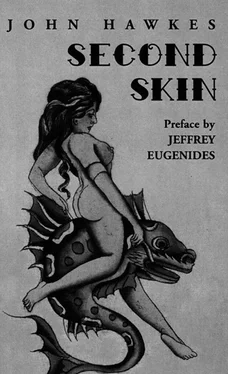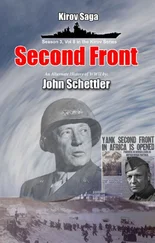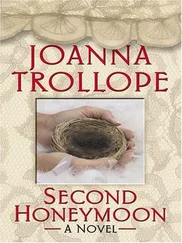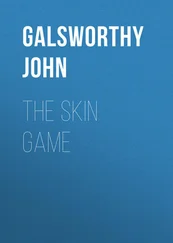So in six months and on the Night of All Saints Catalina Kate will bear her child — our child — and I shall complete my history, my evocation through a golden glass, my hymn to the invisible changing serpents of the wind, complete this the confession of my triumph, this my diary of an artificial inseminator. At the very moment Catalina Kate comes due my crabbed handwriting shall explode into a concluding flourish, and I will be satisfied. I will be fifty-nine years old and father to innumerable bright living dreams and vanquished memories. It should be clear that I have triumphed over Cassandra too, since there are many people who wish nothing more than to kiss me when the midday heat occasionally sends me to the hammock or when the moon is full, stealing, gliding into the warmth and stillness of Plantation House, or in long silvery lines following me to the edge of a moonlit sea. For a kiss. For a shadowy kiss from me.
I receive the sweet ghostly touch of their lips, I kiss them in return. I stand glancing out over that endless ripple of ocean where we have wandered and will continue to wander, softly I call out a name — Sonny! Catalina Kate! — and watch the endless ribbon of our ocean road and smile. I hear the moving shadows and hear those long-lost words—“I have soon to journey to a lonely island in a distant part of my kingdom”—and I can only smile.
Poor Prince Paris.
And so, fresh from the wartime capital of the world, we became her unwitting lodgers, Cassandra and I, Cassandra with her pretended mothering of Pixie, I with my recent and terrifying secret knowledge about Fernandez. Already the fall winds were gathering and every morning from my bedroom window I watched a single hungry bird hang itself on the wet rising wind and, battered and crescent-shaped and angry, submit itself endlessly to the first raw gloom of day in the hopes of spying from on high some flash of food in the dirty undulating trough of a wave. And every morning I stood blowing on my fingers and watching the tom and ragged bird until it flapped away on the ragged wings of its discouragement, blowing, shivering, smiling to think that here even the birds were mere prowlers in the mist and wind, mere vagrants in the empty back lots of that low sky.
Briefly then our new home. White clapboard house, peeling paint, abandoned wasp’s nest under the eaves, loose shingles, fungus-like green sludge scattered across the roof. Widow’s house, needy but respectable. In front a veranda — the old green settee filled with mice, heap of rotted canvas and rusted springs — and a naked chestnut tree with incurable disease and also two fat black Labrador retrievers chained to a little peeling kennel. Protection for the poor widow, culprits who heaped the bare front yard with the black fingers of their manure. And in the rear the widow’s little untended victory garden — a few dead vines, a few small humps in the frost — and, barely upright and half-leaning against a weed-grown shed, the long-abandoned wreck of a hot rod — orange, blue, white, no tires, no glass in the windows, big number five on the crumpled hood — the kind of hopeless incongruity to be found behind the houses of young island widows. Our new home then, and with its cracked masonry, warped beams, sway-backed floors and tiny old fusty fireplaces packed with the rank odor of urine and white ash, it was just as I had dreamed it, was exactly as I had seen it and even smelled and tasted it during all my exotic hot nights at sea when I suffered each separate moment of my personal contribution to the obscene annals of naval history. This house then, and every bit the old freezing white skeleton I had been hoping for. So on my rickety pine bureau I propped my photograph of the U.S.S. Starfish and flung the flight bag in the bottom drawer and hung my uniform in the closet which contained three little seagoing chests made of bone and brass and dried-out cracked turkey skin. Propped up the picture, hung away the spotted uniform, admired the way I looked in a black and white checked shirt and dark blue thick woolen trousers. Ready for gales, ready for black rocks. Everything in order and as I had expected, even to the identical white bowls and pitchers and washstands in Cassandra’s room and mine, even to the marble sink, lion claws on the tub and long metal flush chain in the john. Of course I could not have anticipated the black brassiere that dangled as large and stark as an albatross from the tin shower curtain pole. I stared at it a long moment— this first sign of the enemy — and then shut the old heavily varnished ill-fitting door. There was a tap leaking on the other side.
Of all those mornings, darkening, growing colder, dragging us down to winter, I remember most clearly our first in the widow’s house, because that was the dawn of my first encounter with Miranda. Dead brown rotten world, heartless dawn. Innocence and distraction at half past five in the morning.
I awoke in my strange bed in my strange room in the old white worm-eaten house and heard Pixie crying her fierce little nearly inaudible cry and looked about me at the bare sprawling shadows of monastic antiquity and shuddered, smiled, felt my cold hands and my cold feet crawling between the camphor-ridden sheets. It was still dark, as black as the somber mood of some Lutheran hymn, the flat pillow was filled with horsehair and the blanket against my cheek was of the thin faded stuff with which they drape old ladies’ shoulders in this cold country. And the wind, the black wind was rising off the iron flanks of the Atlantic and driving its burden of frozen spray through the abandoned fields of frost, across the green jetties, over the gray roofs of collapsing barns, driving its weight and hoary spray between the little stunted apple trees that bordered the widow’s house and smashing the last of the dead apples against my side of the house. From somewhere nearby I could hear the tongue swinging about tonelessly in the bell hung up in the steeple of the Lutheran church, and the oval mirror was swaying on my wall, the gulls were groaning above me and Pixie was still awake and crying.
Stiff new black and white checked shirt of the lumberjack, dark blue woolen trousers — heavy, warm, woven of tiny silken hairs — my white navy shoes. I fumbled in the darkness and for a moment stood at my front bedroom window — silhouettes of bending and suffering larch trees, in the distance white caps of hectic needlepoint — for a moment stood at my rear window and watched the high weeds beating against the screaming shadow of the hot rod. And then I felt my way down to the cold kitchen and fixed a day’s supply of baby bottles of milk for poor Pixie.
A lone fat shivering prowler in that whitewashed kitchen, I lit the wood in the stove and found the baby bottles standing in a row like little lighthouses where Cassandra had hastily stood them on the thick blond pine kitchen table the night before, found them standing between an antique coffee grinder — silver-plated handle, black beans in the drawer — and a photography magazine tossed open to a glossy full-page picture of a naked woman. It was five forty-five by Miranda’s old tin clock and noiselessly, listening to the stove, the black wind, the clatter of the apples against the window, I took the bottles to the aluminum sink, primed the old farmhouse pump — yellow iron belly and slack iron idiot lip — discovered a pot in a cupboard along with a case, a full case, of Old Grand-Dad whiskey, and filled the pot and set it on the stove. Then I plucked the nipples from the bottles and washed the bottles, washed the nipples — sweet scummy rubber and pinprick holes that shot fine thin streams of artesian well water into the sink under the pressure of my raw cold thumb — punched two slits in a tin can of evaporated milk — slip of the opener, blood running in the stream of the pump, fingers holding tight to the wrist and teeth catching and holding a comer of loose lip, grimacing and shaking away the blood — and as large as I was ran noiselessly back and forth between the sink and stove until the milk for Pixie’s little curdling stomach was safely bottled and the bottles were lined up white and rattling in the widow’s rectangular snowy refrigerator. I wiped the table, wiped out the sink, dried and put away the pot, returned the cursed opener to its place among bright knives and glass swizzle sticks, paused for a quick look at a photograph of a young white-faced soldier hung on the wall next to half a dozen old-fashioned hot plate holders. The photograph was signed “Don” and the thin face was so young and white that I knew even from the photograph itself that Don was dead. Squeezing my fingers I tiptoed back upstairs, leaned in the doorway and smiled at Cassandra’s outstretched neatly blanketed body and at her clothes bundled on a spindly ladderback rocking chair that faintly moved in the wind. I leaned and smiled, sucked the finger. Pixie had fallen back to sleep, of course, in the hooded dark wooden cradle that sat on the cold floor at the foot of Cassandra’s little four-poster bed.
Читать дальше












